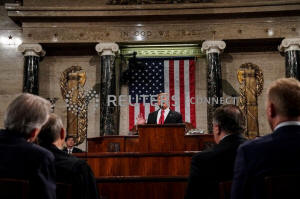|
Cheers, jeers on border as Trump pushes
wall in State of Union
 Send a link to a friend
Send a link to a friend
 [February 06, 2019]
By Jennifer McEntee, Paul Ingram and Julio-Cesar Chavez [February 06, 2019]
By Jennifer McEntee, Paul Ingram and Julio-Cesar Chavez
SAN DIEGO/TUSCON/EL PASO (Reuters) - In San
Diego, California locals threw flip-flops at television images of U.S.
President Donald Trump as he used his Tuesday State of the Union speech
to demand a wall to defend a "dangerous southern border."
More than 400 miles (644 km) east, along the U.S.-Mexico line, the crowd
at the Republican headquarters in Tuscon, Arizona cheered and one man
yelled "yeah!" as Trump promised a wall would make "illegal crossings go
way, way down."
And in El Paso, Texas, Trump appeared to anger much of the city after he
said it was one of the most dangerous in the country - before a border
wall was built in 2008.
Blaming illegal immigrants for ills ranging from overcrowded U.S.
hospitals to working-class job losses, Trump renewed his call for
funding for a border wall, and dug deep into divisions in U.S.-Mexico
border communities.

"El Paso was safe before the border wall," said Jon Barela, a Republican
who runs the city's Borderplex Alliance economic development group. "The
President is living in an alternative universe based on a false
narrative and offensive comments about our way of life."
But El Paso horse trainer John Joyner backed Trump.
"When they built a wall, El Paso became one of the safer cities,"
Joyner, 64, said at a "watch party" held by local Republicans. "We were
able to figure who was coming through our ports of entry."
Trump used about 17 minutes of a speech that ran one hour and 22 minutes
to hammer against the "lawless state" of the border.
He argued that a wall could stop crime ranging from sex trafficking to
gang violence. He said "large organized caravans" were "on the march to
the United States" and troops were needed to stop them.
"If it were me, I would have gone a little harder," said Pima County
Republican Party Vice Chairman Chris King, at the Tuscon "watch party."
"Iíve been out to the border, Iíve seen it, there are places where
anything can get through."
"A BIG WASTE OF MONEY"
In San Diego, high school teacher Stacy Salazar, whose students are
primarily Hispanic and low-income, was appalled that Trump wanted to
spend billions on walls when her school could not afford basic supplies.
[to top of second column]
|

President Donald Trump delivered the State of the Union address at
the Capitol in Washington, DC on February 5, 2019. Doug Mills/Pool
via REUTERS

She was among around 50 people at "Noche de Chanclazos" or flip-flop
night. It was an event put on at an arts center for San Diegans to let
off steam by hurling footwear at Trump's television image projected on a
wall as he spoke.
"People can find a way round the wall, it's just a big waste of money,"
said Salazar.
Trump's demand for wall funding was at the center of the recent 35-day
partial government shutdown. He agreed to reopen the government for
three weeks without money for a border barrier, and congressional
negotiators are working to find a compromise to avert another shutdown
on Feb. 15.
In his speech, Trump suggested "compromise" and said he would be
prepared to only build a wall in areas where the U.S. Border Patrol saw
it necessary - a far cry from his 2016 campaign pledge for one from
coast to coast.
On that note, Pima County, Arizona Sheriff Mark Napier said his address
was largely a "positive message."
"The wall is only a portion of the presidentís plan," Napier said. "The
plan includes a lot of stuff that I think would enjoy wide bipartisan
support, but thereís an auditory shutdown when people say two words: the
wall."
To be sure, in San Diego, every time Trump mentioned the word "wall,"
the crowd shouted "No Wall!" A barrage of footwear hit Trump's image
when he said "Walls save lives."
"Border walls push people towards deadly crossing areas," said Pedro
Rios, director of event host American Friends Service Committee, a
social justice group.
(Reporting by Jennifer McEntee in San Diego, Paul Ingram in Tuscon and
Julio-Cesar Chavez in El Paso; Writing by Andrew Hay; Editing by
Clarence Fernandez)
[© 2019 Thomson Reuters. All rights
reserved.]
Copyright 2019 Reuters. All rights reserved. This material may not be published,
broadcast, rewritten or redistributed.
Thompson Reuters is solely responsible for this content.
 |